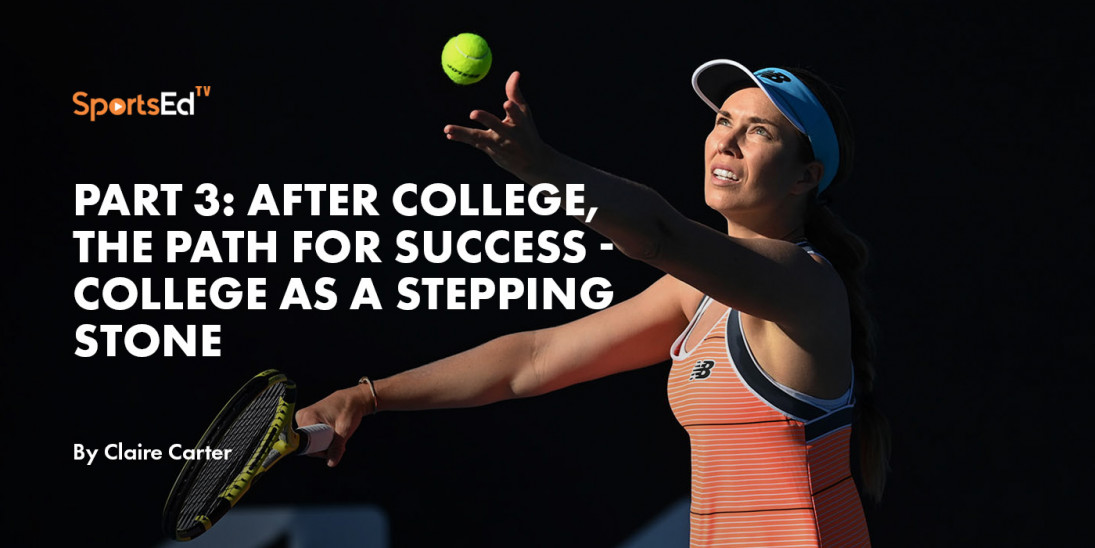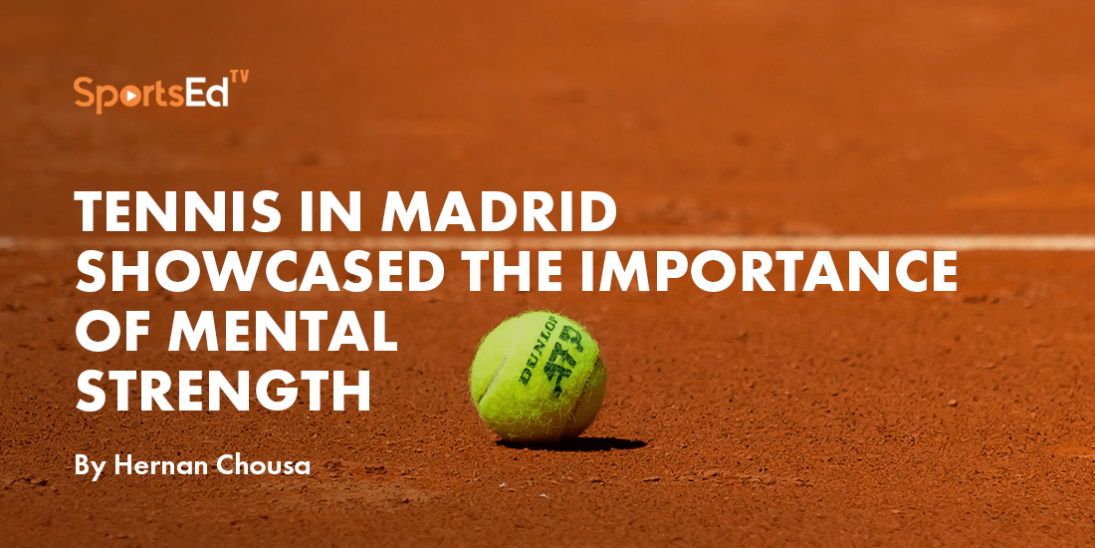Tennis
Welcome and thanks for visiting...

Part 3: After college, the Path for Success - College as a Stepping Stone

This is the third part of a three-series blog on college tennis. The first part, focused on making the college tennis decision, can be found at: https://sportsedtv.com/blog/before-college-the-path-for-success-college-as-a-stepping-stone-part-1-tennis. The second part, discussing the college tennis experience and its benefits, can be found at:https://sportsedtv.com/blog/During-College-the-Path-for-Success-College-as-a-Character-Builder-tennis. This final segment covers the after-college decision – what college tennis players do professionally after their collegiate athletic careers.
After college tennis, the path for success - college as a stepping stone
“Most universities at this level are like Olympic villages, in terms of the training opportunities. You can get really good if you can keep the dream alive.” This comment from Vanderbilt women’s tennis head coach Geoff Macdonald, as reported by the USTA, is a reminder of how college tennis is a fantastic platform for the future. At the same time, completing a career in college tennis presents most college athletes with a complex choice – what’s next for me?
4 different options a tennis player has after college
After college, tennis players have basically four general career options. One can turn professional, continue school in other educational programs, begin a career in some other aspect of tennis or embark upon a completely different professional career path. In this blog post, I will explore each of these alternatives while also sharing some of my own personal experiences as I graduated from the University of Washington in Seattle and evaluated my future.
Profesional Tennis Player After Collegue
For many strong collegiate tennis, turning into professional tennis players and playing on the pro tour is a real option. The success of former college tennis players such as John Isner and Danielle Collins has highlighted the benefit of leveraging college tennis as a platform on which to build a professional tennis career. Participating on tour after four years in college can be a real advantage because you are more developed as a tennis player and person. You have gained experience competing in singles and doubles at a very high level. You have become a stronger athlete, more knowledgeable with regards to nutrition, fitness, psychology, mental, tactical, handling pressure, scheduling, and more mature emotionally to handle the ups and downs of the professional tour.
.jpg)
John Isner
Of course, there are challenges to consider with pro tennis as well. Few tennis players will have great sponsorships right out of college so the costs of traveling the world, hiring coaches, and maintaining equipment can be a significant hurdle until prize money starts coming in. Furthermore, that prize money is not typically tremendous in the early stages of a pro tennis career. Tennis Players often toil at a lower level, far-flung tournaments with modest prize money, trying to pick up previous rankings points.
.jpg)
Danielle Collins
Post Graduate Program for Tennis Players After College
Continuing your education is a readily available option for many college athletes. Of course, any post-graduate program that is open to the general student population will be available to similarly accomplished student-athletes. On top of this, in some cases graduate students will be able to play competitively for their graduate schools!
This is a great opportunity for a shout-out to my long-time friend Alistair Higham. Alistair coached me from age 8 until 19. In addition to being a fantastic coach, Alistair is the team manager for the Great Britain University Student Team and also heads up the Great Britain University Program for the Lawn Tennis Association. This program allows tennis players to continue to compete in the sport while studying for a master's or Ph.D. in the UK. More information can be found at:www.lta.org.uk/universities.

Tennis Carrer: Tennis Coach, Tennis Directors, Tennis Agents, Tennis Manager
Option number three is to stay involved in the sport of tennis as a career, not as a professional touring player but rather in some other capacity. This can involve coaching, where jobs are available at private clubs, colleges, and even many high schools. Tennis jobs also include working in tennis marketing, equipment sales, announcing, agent work, and club management. Employers can be as wide-ranging as sporting goods manufacturers to broadcasting organizations.
I chose to stay in the sport of tennis. I have loved the sport of tennis, ever since I was a little girl, and I cannot imagine doing something not involved or connected to my sport. I have coached in a club for 16 years, been a college coach at my alma mater, and coached privately. Tennis has brought me many different opportunities, such as meeting and connecting with people all around the world, traveling, and experiencing many different cultures. I have been involved with print and digital commercials, as well as advertising products. Being paid to do something I love is simply amazing.
As a tennis coach, I can help people with their goals to improve their tennis, whether that is as a beginner, adult, or an advanced junior. This opportunity to make a positive impact is very rewarding. This also extends to my clients’ fitness, as well as their overall health and well-being. Being a social person, coaching also provides me with fun and consistent interaction with people who I like and who respect what I bring to the table.
Tennis Certification (USTA, PTR, ITF)
Certifications are helpful to build a career in tennis coaching, including those offered by the United States Professional Tennis Association (USPTA) and the Professional Tennis Registry (PTR). It’s even possible to start planning a coaching career while in college – I became PTR certified as a coach while a student at the University of Washington.
Tennis Graduate: Profesional Carrer Outside Tennis
Finally, graduating collegiate tennis players can seek out careers that are outside of the sport. It probably goes without saying that college athletes are not much different from any other college graduate. In this regard, they will pursue jobs that challenge them, provide useful experience, and are related to their fields of interest or background. Most of my college teammates, for example, have built thriving professional careers in areas other than tennis. One is in the commercial real estate business. Another is a CEO. One is a police officer. My teammates’ career choices have also involved jobs in sales, marketing, and accounting.
Even outside the world of tennis, those transferable skills developed as a college athlete will help you in your personal and professional life. Playing college tennis requires determination, organization, teamwork, leadership, effective time management, mental and physical strength, and often a healthy dose of psychology! All of those skills are useful in the general working world and most are highly sought by employers. Many companies are fond of college athletes in general and often have former athletes among their executive ranks.
Indeed, this observation provides an opening to tie together my blog series on college tennis. Playing college tennis is a life-changing experience that, for me personally, was one of the best decisions I have ever made. In the first part of the series, I wrote about the decision process for tennis juniors around playing college tennis and what needs to be done to prepare for trying to play tennis in a college program. The second blog was focused on the college tennis years, the hard work, the learning, and the fun of that exciting and energizing period. Then in this third part of the series, we explored life after college tennis.
Full circle to today, I’m very grateful for everything the sport of tennis has given to me. I had an exciting junior career that included playing in Junior Wimbledon and obtaining a WTA ranking, I played on a Division I college squad at the University of Washington and found success as a team, and I have had a long and happy career as a tennis coach, helping others play the game I love to the best of their ability. Thank you tennis! And thank you SportsEdTv for having me here!




